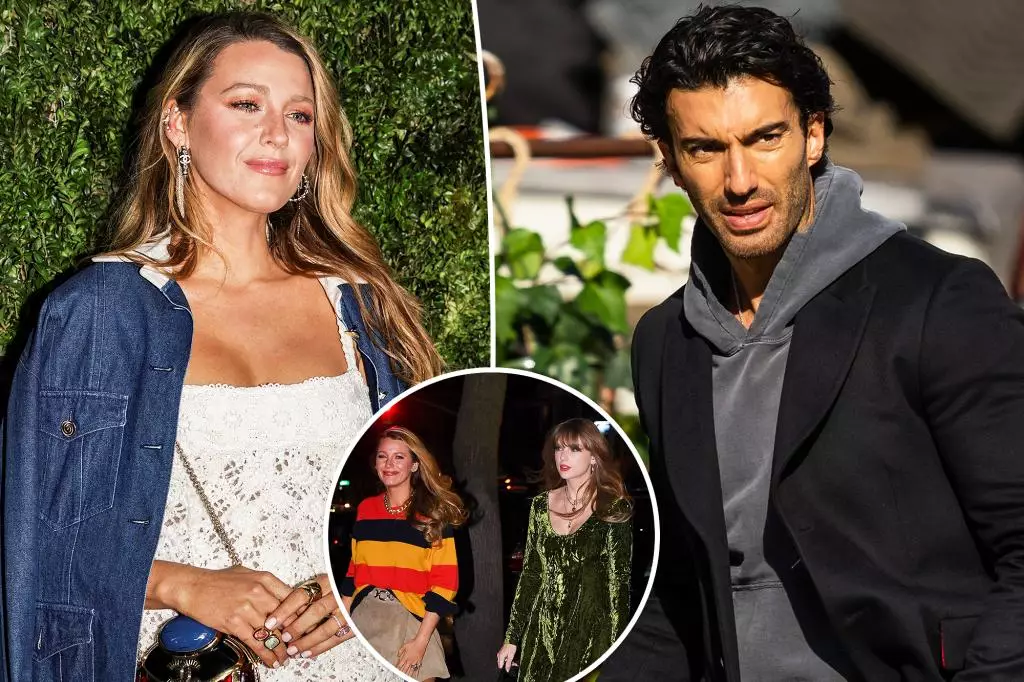In an unexpected twist within Hollywood’s bustling ecosystem, Blake Lively has ignited a legal firestorm against director Justin Baldoni. Filing for a protective order, Lively aims to shield her private communications with pop icon Taylor Swift from Baldoni’s prying eyes amid their increasingly messy courtroom battle. This clash, taking place in New York, reflects deeper themes of privacy invasion, media tactics, and the complexities of navigating celebrity relationships in the public eye.
The Motives Behind the Request
In her motion, Lively asserts that Baldoni’s elation in requesting access to her conversations with Swift is less about substance and more about strategy. She claims these interactions are “not central” to the allegations being posed by Baldoni’s production company, Wayfarer Studios. Her argument underscores a potent concern: the exploitation of personal relationships by legal entities seeking public sway. The allegation that Baldoni is utilizing Swift’s name as leverage raises ethical questions about the exploitation of fame for personal gain within the legal framework.
Further complicating the narrative, Lively’s legal team has highlighted that Baldoni’s previous attempts to correlate her professional rapport with Swift to their legal dispute appear to be a meticulously crafted ploy. When they withdrew a subpoena directed at Swift, Lively’s spokesperson suggested that Baldoni’s motives were clear—an intention to insert a globally recognized figure into a personal feud, using her influence to manipulate public sentiment. This tactic raises the stakes not just for Lively, but for Swift as well, who is increasingly becoming ensnared in their conflict.
Sowing Seeds of Public Relations Tactics
This legal debacle transcends mere courtroom disputes. It looks squarely at the intersection of media, justice, and personal reputation. Lively’s allegations indicate that Baldoni’s team engaged in what can only be described as PR scenario planning—treating Swift’s fanbase as a factor to be managed rather than a group of individuals. The use of such tactics speaks volumes about how public figures can be swept into one another’s battles, often without consent or prior indication, all in the name of ‘strategy.’ It reveals a sad truth about the modern landscape: where courts and the media collide, and personal dignity often takes a back seat to public perception.
The assertion that accessing Swift’s communication could be deemed “duplicative” and “unnecessary” adds weight to Lively’s argument. It suggests an exhaustion of relevant channels and leads to a pressing question: Is the pursuit of celebrity conversations a process that serves justice or merely prolongs the drama for the fringes of media intrigue?
The Fallout of a Legal Counterattack
Baldoni’s countersuit, a staggering $400 million claim against Lively and her husband Ryan Reynolds, caught everyone off guard. The dynamic between Hollywood power couples and directors often plays a huge role in shaping not only their careers but also their reputations. The refusal of the court to recognize Baldoni’s claims has turned the tide on what seemed like a straightforward legal attack. The fact that his arguments have been dismissed reflects not only on the strength of Lively’s defense but also raises important implications regarding the success of high-stakes lawsuits in the entertainment sector.
This judiciary blow may propel Baldoni’s legal team to reassess their strategy. Attempting to amend claims regarding “breach of implied covenant” could indicate a desperate bid for legitimacy in the eyes of the law, but this leads to a risky gamble in the media spotlight.
The Broader Implications
As this gripping saga unfolds, one cannot help but wonder about the broader implications of celebrity culture and the legal profession’s adaptation to it. This case epitomizes the precarious nature of personal privacy amid the insatiable appetite of the online audience. When personal communications are drawn into legal disputes, it becomes a double-edged sword; advocates may aim to defend their clients, but they also risk damaging the reputations of everyone involved.
In a world where every text and conversation can be scrutinized in the court of public opinion, how much privacy can celebrities realistically expect? This question sits at the heart of Lively’s protective order request—a desire to reclaim agency over personal narratives that may otherwise be distorted by litigation and media manipulation.
As we approach the trial date set for March 2026, the implications of this legal drama will echo through the industry, possibly reshaping the contours of celebrity privacy and the intersection of fame and accountability in unprecedented ways. The battle may be set within legal confines, but the implications extend far into the realm of societal norms around celebrity culture, press freedom, and ethical legal practices.

